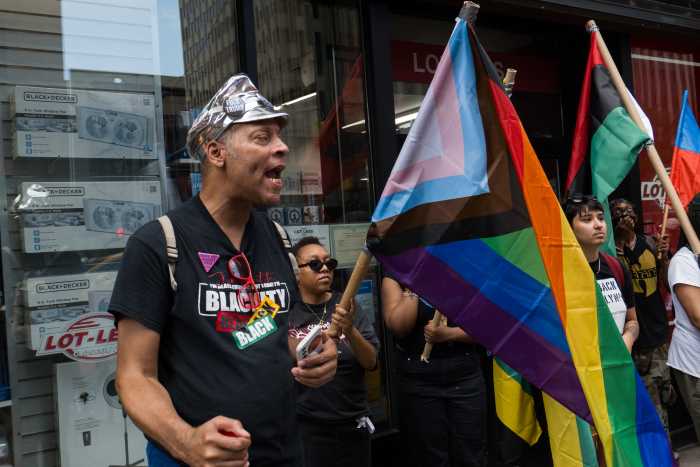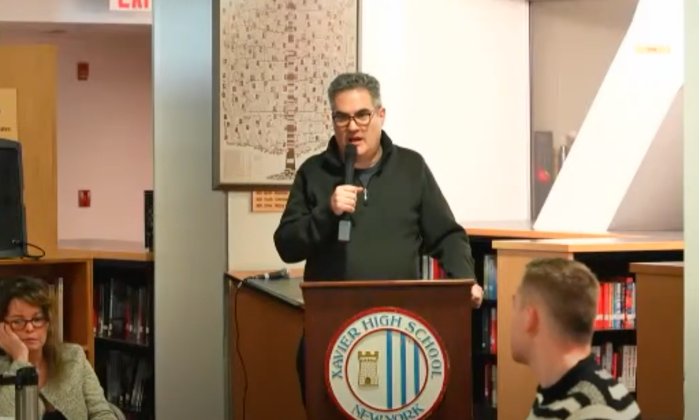A hostile crowd of about 800 people, including city officials, filled the Stuyvesant High School auditorium on Tues., Nov. 10, at a hearing on New York State’s plan to permit gas drilling in the state’s Southern Tier, including the six counties of the New York City watershed.
The crowd demanded that the state prohibit natural gas drilling in the watershed, which provides 90 percent of the city’s drinking water. Many demanded a complete ban on natural gas drilling in all 27 counties of the state’s Southern Tier where the gas-bearing Marcellus Shale formation lies 3,000 to 6,000 feet under the surface.
The Nov. 10 official Department of Environmental Conservation hearing, the only one scheduled in New York City, had 160 speakers signed up, and not all of them had time to speak before the five-hour session closed at 11 p.m.
One man leaped on stage at the beginning of the hearing to interrupt the testimony of Deputy Mayor Edward Skyler and shouted, “We want a statewide ban on gas drilling. We don’t need any more public hearings.” Sympathizers in the audience stood, waved “State Wide Ban” signs and cheered, but a state trooper escorted the man out.
Speaking for the Bloomberg administration, Skyler said the proposal to allow horizontal hydraulic-fracture drilling for natural gas in the city watershed posed a public health risk.
“We have asked the state Department of Health to comment on the health implications of the proposal,” Skyler said, adding that in view of the potential cost of repairing damage to the city’s water supply by drilling accidents, it would be prudent to ban drilling in the watershed.
An hour before the hearing, Manhattan Borough President Scott Stringer led a rally of environmentalists and elected officials, who denounced proposed safeguards in the state’s drilling plans as completely inadequate.
“A great environmental crisis is facing all of us,” Stringer said. “The safety of the watershed must never be taken for granted. The state says, ‘Don’t worry, we have protection in place.’ We say, ‘Kill the Drill,’ ” said Stringer, leading the rally in a “Kill the Drill,” chant.
Congressmember Jerrold Nadler and Councilmembers James Gennaro, from Queens, and Manhattan’s Daniel Garodnick and Jessica Lappin also demanded a ban on watershed drilling at the rally and at the hearing later. Elected officials, including Comptroller Bill Thompson, Assemblymember Deborah Glick and Councilmember-elect Margaret Chin, also called for a ban on watershed drilling.
The statement issued last week by Chesapeake Energy, a leading gas driller, that it would not drill in the city’s watershed was not satisfactory, said environmental activists and elected officials.
“Chesapeake’s promise is temporary and not enforceable,” said Eric Goldstein, executive director of the Natural Resources Defense Council. “A press release is not a contract,” stressed Goldstein, referring to the Chesapeake statement.
Joe Levine, an official of NYH20, a pure-water advocate, said that Chesapeake officials at a state Senate Environmental Committee hearing in Albany on Nov. 10 refused to sign a statement that the company would permanently give up natural gas drilling in the watershed.
The hydro-fracture drilling under review requires millions of gallons of water, laced with a cocktail of toxic drilling chemicals, to be injected into the shale formation to fracture it and release the gas confined in the rock.
Environmentalists say the state’s proposed drilling standards do not regulate where the fracking water would come from and how it would be transported to the wellheads. The rules about storing the returned chemical-laden water and disposing of it are also inadequate, say opponents of the drilling plan.
“All the state is concerned about is the short-term economic gain,” said Craig Michaels, an executive with the environmental group Riverkeeper. “They have not looked at the long-term costs of deforestation and water degradation in the area. It’s insane that we are here today having to protest a proposal to allow hydro-fracking drilling in the watershed,” he said.
Environmental advocates and elected officials noted that the city’s Catskill-Delaware watershed is one of only five in the nation exempted from the federal requirement to filter drinking water. That exemption, which comes up for renewal in seven years, could be cancelled because of the dangers of hydro-fracking. The cancellation would force the city to spend $10 billion to $20 billion for a filtration system, plus hundreds of thousands of dollars in annual operating costs.
The city has already spent $2 billion on a filtration system for the Croton watershed, which provides drinking water for 10 percent of the city’s population. Moreover, whether filtration could take fracking chemicals out of drinking water is questionable, said Councilmember Gennaro, a trained geologist.
Catherine McVay Hughes, vice chairperson of Community Board 1, which covers Lower Manhattan, submitted testimony that the board last month passed a unanimous resolution calling on Governor Paterson and other elected officials to support an amendment to the state drilling plan that would ban hydraulic fracturing in the watershed. Assembly Bill AO8748 would prohibit drilling for natural gas within the New York City watershed or anywhere within five miles of its boundaries.
The C.B. 1 testimony noted that state files show there have been 270 drilling accidents in the state since 1979, including wastewater spills, well contaminations, gas migrations and other damage related to gas production.
The C.B. 1 submission also notes that there are about 17 inspectors in the Department of Environmental Conservation’s Division of Mineral Resources, a number hardly enough to monitor conventional wells, let alone the expected high number of new hydro-fracking wells.
D.E.C. recently extended the public comment period from Nov. 30 to Dec. 31, but C.B. 1 and other opponents want the comment period extended to the end of January.


































